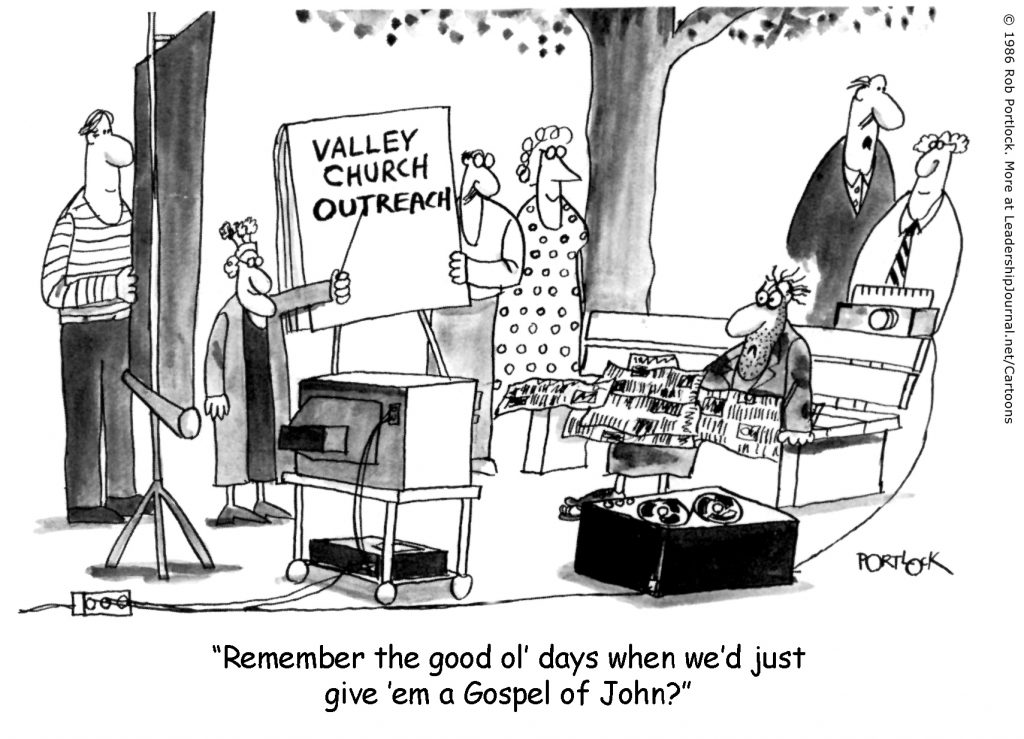Dear pastors and ministry leaders:

LifeWay Resources President Thom Rainer is pretty good at predicting trends in the North American church. He’s been analyzing those trends for years, and recently shared his take on what lies ahead in an article titled “The Top Ten Major Trends for 2017.” I’ve reproduced his list below (with minor edits) and then provided comments concerning how these trends might impact us in GCI. I encourage you to discuss these with your leaders as you consider together how they might impact the various ministries in your congregation.

- Renewed emphasis on evangelism. Many church leaders want to know how their churches can better reach non-Christians where they are. An emphasis on the “Jerusalem” of Acts 1:8 will result in more intentionality in evangelism and, thus more people becoming followers of Christ.
- Renewed emphasis on practical ministries. Many of our churches have gone through a period of theological recovery for which I am very grateful. Now the leaders want to know the “how” along with the “what.” They are looking for practical solutions built on biblical truths.
- Increased frequency of allegations of child sex abuse in churches. Sexual predators see churches as places of vulnerability and opportunity. Too many churches are not prepared or equipped to deal with these issues.
- Increased financial fraud in churches. Some of those with ill intent see the church as a place of opportunity to commit theft.
- The multi-site movement becoming a neighborhood church movement. The next extension of this movement is an intentionality to start or acquire campuses to reach and minister to residents of specific neighborhoods.
- An acceleration of church closures. The death rate of churches is sadly increasing in America. I do not see that trend abating.
- Church acquisitions becoming normative. I am surprised how quickly churches and denominational entities have become strategic about acquiring churches that are declining and dying. While the trend of church closures is not encouraging, it is encouraging that more churches are becoming intentional about saving these churches from total extinction.
- Worship center downsizing becomes normative. The millennials are leading the way to attend worship services that are small to mid-size. As a consequence, the huge worship centers have lost their attraction.
- Longer pastoral tenure. This trend is being led by millennial pastors who do not desire to climb the ladder to larger churches. They are more desirous to stay and make a long-term difference in the community.
- The remarkable shift toward continual learning. Our research is showing that pastors and church staff tend to have greater success in their roles if they are intentional about continual learning. Some go the path of greater formal education, but more are receiving coaching and intentional programs of continual learning.
Let’s now consider how these trends might apply within our GCI context:
- Evangelism. Does you congregation see evangelism as a fundamental part of its primary Great Commission (disciple-making) work? With all the energy and resources being expended, are unchurched people being introduced to the gospel? Are they experiencing God’s lavish grace and love within a church community into which they are invited and warmly welcomed? To help you focus on this important issue, we’ve published in this issue an article from Pastor Sam Butler on a community assessment process. I encourage you to implement what he suggests.
- Practical ministries. In GCI we begin with the questions, Who is God? and Who are we in relationship to God? This leads us to ask, What is the Triune God up to and how might we participate? Concerning that participation, do our ministries help people, in practical and sustainable ways, to participate actively in the stunning reality of the love and inclusivity of Jesus Christ? Are people drawn to the community of our congregations because the love of Jesus made evident through our ministries? Sam Butler’s article is also highly relevant in this area.
- Protection of children and youth. In the midst of our inclusivity, do we have in place proper procedures for vetting our children and youth workers? Are we growing in our understanding of the threats and what we must do to counter those threats so that our children are protected?
- Financial stewardship. Are the treasurers and other members of our financial teams up to speed in sound financial management practices? Do our lead pastors (and other primary leaders) consistently review all financial statements to provide accountability?
- Neighborhood churches. In GCI, “multi-site” means a network of organic small groups in areas where we have connections and influence. Are we committed to hosting such sites? Will we carve out time from our busy schedules to include others into the community of the church through small groups that are neighborhood oriented?
- Church closures. GCI in the US has 96 Fellowship Groups (very small congregations) and 200 churches ranging from 15 to 120 in average attendance. Some are growing, many are not, and thus we are very much a part of the national trend that includes church closures. This trend does not demoralize us because we know the Lord’s promise to the church in general that, “the gates of hell will not prevail against it!” We need not fear the closures that are a “natural” part of the cycle of church life. Moreover, our focus, instead of merely “surviving” is on “thriving.” Toward that end, we challenge all our churches to do what they can to help advance our forward movement as a denomination—we’re all part of one church family, and we’re optimistic about our shared future. Each congregation, no matter its size or potential for longevity, can make a positive contribution to that future.
- Church acquisitions. We’re grateful that a percentage of our churches are experiencing renewal both in spirit and in numbers. This gives us hope, and we anticipate these renewal churches sparking new life in places where some of our older churches may be nearing the end of their life-span. Indeed, this has already happened in a few spots.
- Worship center downsizing. It seems that the big concert-type worship era is behind us. This trend is a good opportunity for worship venues to become more authentic, relational and thus intimate and family-like. We are well positioned to join in this trend.
- Longer pastoral tenure. It is exciting to see the next generation of GCI pastors having a deep love and commitment to the community where they feel called to serve. This trend points to the reality that not all pastors can be employed full-time by the congregations they serve. That’s okay. Many of our pastors will likely need to take jobs within the community where they serve, becoming an integral part of the daily rhythm of community life. Could this be the direction the Holy Spirit is taking us (along with the rest of the Body of Christ)? If so, how are we responding?
- Continual learning. This trend is certainly embraced and advanced in GCI. We are blessed to have two online educational institutes: Grace Communion Seminary (master’s level) and Ambassador College of Christian Ministries (for anyone with a high school education). We are also blessed with a ministry coaching component that provides what we refer to as “wrap-around support” for our new pastors, church planters, interns and pastoral residents. Life-long learning is a part of the GCI culture that we plan to continue and strengthen in the years ahead.
Let’s conclude with Jesus’ admonition in Matthew 16:2-4 (RSV):
When it is evening, you say, “It will be fair weather; for the sky is red.” And in the morning, “It will be stormy today, for the sky is red and threatening.” You know how to interpret the appearance of the sky, but you cannot interpret the signs of the times.
I pray that God will help us interpret well the “signs of the times,” in our day, including the trends noted above. It is important that we comprehend these trends, following the Holy Spirit as he leads us in negotiating the “winds of change” that are impacting all aspects of life in North America (and all the world), your church included.
Thank you Lord for giving us visionaries like Thom Rainer to help us understand what lies ahead and make adjustments accordingly. Thank you most of all for giving us Jesus to be the Head of the Church both in 2017 and beyond! Amen.
Greg Williams
GCI Vice President, Superintendent of U.S. Ministers, Director of GCI-USA Church Administration and Development



Please note that comments are moderated. Your comment will not appear until it is reviewed.